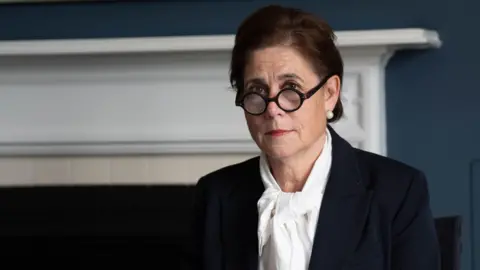Inquiry 'extremely dissatisfied' with health trust
 PA Media
PA MediaThe chairwoman of the public inquiry into more than 2,000 mental health deaths in Essex said she was "extremely dissatisfied" with a health trust's late submission of evidence.
Baroness Lampard was due to hear evidence on Wednesday about a monitoring and alert system, called Oxevision, on wards and units operated by Essex Partnership University NHS Foundation Trust (EPUT).
But the Lampard Inquiry was told EPUT submitted a witness statement at the end of last week showing it had made "very substantial changes" to its use of Oxevision, leaving legal teams less than three working days to review it.
An EPUT spokesperson said it apologised to Baroness Lampard for not sharing details sooner.
'Highly unsatisfactory'
Oxevision is designed to help staff monitor the safety of patients in their bedrooms and bathrooms by using infrared sensors and cameras, and to reduce the number of self-harming incidents.
Nicholas Griffin KC, lead counsel to the inquiry in London, described how they were due to hear evidence on Wednesday relating to Oxevision from three witnesses, including Zephan Trent, executive director of strategy, transformation and digital and senior information risk officer at EPUT.
The inquiry was told on Tuesday that Mr Trent had made a "brief reference" in a witness statement in March that a review was being undertaken of EPUT's use of Oxevision, and that the inquiry would be updated about the review's outcome, but "no further information was given".
The inquiry was then informed on Wednesday last week "after working hours" that EPUT would be serving an additional witness statement, which was not received until mid-morning on Friday.
Mr Griffin described it as an "unacceptably short" timeframe, giving legal teams for the inquiry and core participants just days to review and consider it.
The additional statement revealed "very substantial changes" to the use of Oxevision technology, Mr Griffin said, "which were only authorised at board level last Wednesday".
"The situation is, to say the least, highly unsatisfactory," Mr Griffin told the inquiry, explaining that due to the "extremely late disclosure" from EPUT, the planned evidence sessions on Wednesday would be postponed to a future date.
 Lampard Inquiry
Lampard InquiryAfter Mr Griffin's statement, Baroness Lampard said "the use of Oxevision is, and will remain, a matter of significant interest for the inquiry".
"My decision to postpone evidence into this area should not be viewed in any way as enabling EPUT to avoid answering questions about its use of Oxevision or to evade responsibility - quite the reverse," she said.
"I wish to make it clear that I am extremely dissatisfied with EPUT's late submission of evidence.
"I have said previously, and I repeat, that I will not hesitate to use my statutory powers to compel evidence should this be required."
The inquiry - which is looking into the deaths of more than 2,000 people under mental health services in Essex between 2000 and 2023 - announced on Tuesday afternoon that it will hold a private evidence session on Wednesday with Hat Porter, a representative of Stop Oxevision, which would be made public in due course.
Apology
A spokesperson for EPUT confirmed to the BBC that its new standard operating procedure regarding the use of Oxevision came into effect on 7 May.
"We have to react to changing guidance around many areas of the delivery of care and have been reviewing our operating procedure for the use of Oxevision remote monitoring technology following new NHS guidance which was released in February 2025," the spokesperson said.
"The review has been completed and the new standard operating procedure is now in place.
"We apologise to Baroness Lampard and anyone impacted that we didn't share details of changes sooner."
Follow Essex news on BBC Sounds, Facebook, Instagram and X.
